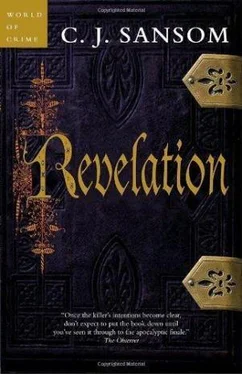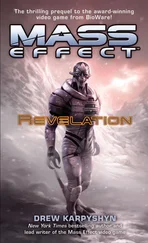THE RAIN CONTINUED during our long ride to the Charterhouse. I was constantly blinking water out of my eyes as Sir Thomas, Barak, the guard Janley and I rode together; the others listening as I shouted questions to Janley about what had happened there. We rode as fast as we could along roads that were turning to quagmires, mud spattering our horses and our boots.
'The Charterhouse watchman came running over to the Green Man this morning,' Janley told us. 'The place is empty but for him and the Bassano family, the King's Italian musicians; they've turned some of the old monks' cells into accommodation for them.'
'No one else lives there?' Sir Thomas asked. 'No, sir. The place is used to store the King's hunting equipment and tents and costumes for the masques. The watchman's known as a hopeless drunkard. Apparently he used to spend most evenings in the Green Man getting sow-drunk; Lockley and Mistress Bunce often had to put him outside at closing time. One of his duties is to open and close the lock gates in the old conduit-house, keep the water flowing on through the cellars of the houses in the square. He would forget and the locals had to go over and remind him.'
'Do the locals know about this?' Harsnet asked. 'No, sir. The watchman came running over an hour ago, babbling about floods and a dead man in the conduit. He knew I was some sort of official guard. He said it was Lockley. I sent him back and rode to the coroner's office, which I'd been told to do if anything happened.'
'You've managed to keep the truth of what happened to Mrs Bunce a secret?' I glanced at Janley, noticing the man looked tired and strained.
'Ay. I've told everyone who called it looks like Lockley came back, murdered her and fled. I've hinted it was about money. A lot of neighbours and old customers have called round.'
'Good. Well done.'
'I'll be glad to be gone, back with my family. I keep thinking of that poor woman lying there. Especially at night.'
'She was only a tavern keeper,' Sir Thomas grunted. 'Be thankful it wasn't someone more important, it would be harder to cover up what happened.'
WE ARRIVED AT Charterhouse Square and followed the path between the trees covering the ancient plague pit. We rode past the deserted old chapel. The door was closed; the beggars would be out seeking alms in the town. We drew up at the small gatehouse set in the long brick wall of the dissolved monastery. There was a rail for horses there and we tied our animals up. Sir Thomas frowned at the mud on his fine netherhose.
Janley knocked loudly at the door. Shuffling footsteps sounded and a thin middle-aged man with a red face and a bulbous, pock- marked nose opened it and peered at us with frightened eyes.
'I've brought some people to see the body, Padge,' Janley said gently.
The watchman looked at us uncertainly. 'They'll have to climb down to the sewer. I don't know how you'll get him out. He's fixed to the lock gates somehow, blocking them. He's naked. It's horrible. Why has someone done this? Why?' His voice rose.
'Leave it to us, matey,' Barak said soothingly.
We followed the watchman through the gates, past the ruins of the old monastic church with the windows out and the roof off, and found ourselves in a large, square, grassed courtyard. In the centre stood an octagonal, copper-roofed building, with taps on the sides.
That had to be the old monastic conduit, fed by the streams from Islington, where the monks had drawn their water and which then went on to drain the sewers under the houses in the square. Round the sides of the yard stood the old monks' cells, little square two- roomed houses, each with a small patch of garden behind, water dripping from the eaves. This would have been a peaceful place once. The monks of the Charterhouse had lived secluded lives in their cells round the central square, an architectural pattern unique among monastic buildings. The cells had stout wooden doors secured with padlocks. To our left was a larger building, the doors open. I saw figures within.
'I've put the Bassano family in there,' the watchman said. 'They came into the gatehouse earlier, gabbling away about being flooded out.' He pointed to the conduit and I saw that water was seeping and bubbling up between the flagstones surrounding it. A section of the grassy square between the conduit and the cells on one side was waterlogged. Still the rain pelted down on us. The watchman wiped his face with a trembling hand. 'I went to look at the conduit-house where the lock gates are, and saw a body jammed in front of them. I leaned over the rail and saw his face, saw it was poor Francis.'
'Stopping the waters of the Euphrates,' I said quietly. 'Master Padge, did you hear anything last night?'
'No. A man has to sleep,' he added in a truculent mumble.
'Not if he's a watchman,' Sir Thomas said sharply. 'Where are the Italians?'
Padge led the way to the building with the open door. It had evidently been the monastic chapter house, for there were benches round the wall as there were at Westminster Abbey. But this was a far smaller, more austere room. Most of the space was taken up with chests and wardrobes; to store the costumes for the masques, no doubt. Two huge suits of armour stood beside them, and half a dozen enormous jousting lances were stacked against the wall. A little group of people had found space on the benches and sat huddled together, looking scared. They were swarthy, dark-haired; four men and three women with children in their laps. All were clutching musical instruments, lutes and tabors and even a harp. I saw the men's doublets and the women's dresses were soaked through. 'Does anyone speak English?' I asked.
One of the men stood up. 'I do,' he said in heavily accented tones.
'You are the Bassano family, the King's musicians?'
'Yes, sir.' He bowed. 'I am their servant, Signor Granzi.'
'What has happened to you?' Sir Thomas asked. 'You look like a lot of drowned rats.'
'We woke this morning to find the floors of our quarters in water above our feet,' the Italian said. 'The ground goes downward from that conduit. Water was coming into our rooms. We had to rescue our instruments. We came here, then called the watchman. What is it, sir? We heard the watchman cry out.'
'Nothing to worry you.'
'Did any of you hear anything strange last night?' I asked. Master Granzi consulted the other in their strange, musical tongue, then shook his head. 'No, sir. We were all asleep.'
Sir Thomas grunted. 'Come on, Padge. Take us to where you found the body.' He pushed the watchman out into the rain; a born bully.
As we crossed the courtyard Harsnet fell into step beside me. 'Those musicians perform before the King. If they learn there has been a killing here it will be a fine bit of gossip to tell around the court. They must not find out what has happened.'
'I agree.' Was that what the killer had intended?
'We'll say it was an accident.'
'Padge is a drunk. He'll talk in his cups.'
'I'll take him with us when we leave,' Harsnet said. 'Keep him somewhere safe and put one of Sir Thomas' men in here for now. I'll square it with the Court of Augmentations.'
Padge led us back to the gatehouse. He had appropriated one room, a truckle bed on the floor. The room stank of beer. There was a fire burning in the grate, and he lit three lamps from it. He passed them to Barak, Janley and then me.
'We'll need these, sir,' he said and led the way back to the outer courtyard. We followed him, heads bowed against the rain, into a low, square building standing on its own. In the centre of the stone floor was a large square opening, protected by a low railing. An iron ladder bolted to the side led down into a brickwork shaft streaked with green lichen. A large wheel stood off to one side.
Читать дальше












